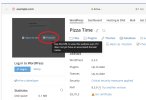- Server operating system version
- Ubuntu 24.04 LTS
- Plesk version and microupdate number
- Plesk Obsidian Version 18.0.62 Update #1
Hi guys,
I am migrating from Hostgator with managed servers running cPanel to Fasthost with unmanaged servers running Plesk. I have never had to manage a server myself, used Plesk nor ever run SSH before so bear with me.
I am migrating around 40 domains from cPanel to Plesk and have run into issues. Some domains have migrated successfully but others haven't, and I've noticed that most of those that failed migration are running WordPress websites. Also on my personal domain, I have changed DNS to point to Plesk and have figured out how to send and receive emails, however all my sent emails arrive in the users junk.
1) How do I fix the migration issue? The error I get is:
Failed to detect databases of subscription.
Command execution failed on the local server with non-zero exit code.
command: rsync -r --chmod=Fu=r,Du=rwx,go= --timeout=30 -e 'ssh -i /usr/local/psa/var/modules/panel-migrator/sessions/20240709031156/ssh-keys/id_rsa.162.240.2.185 -p 22 -o PasswordAuthentication=no -o StrictHostKeyChecking=no -o GSSAPIAuthentication=no' /usr/local/psa/admin/plib/modules/panel-migrator/backend/lib/python/parallels/plesk/source/legacy/extras/plesk_11_5_pmm_shared/ [email protected]:/root/plesk_migrator/plesk_migrator-z28wp8wrtkeyvv9s614dv8bkq6nt55ab/pmm_agent
exit code: 255
stdout:
stderr: ssh: connect to host 162.240.2.185 port 22: Connection refused
rsync: connection unexpectedly closed (0 bytes received so far) [sender]
rsync error: unexplained error (code 255) at io.c(231) [sender=3.2.7]
The errors in the logs shows:
a) Unable to connect to '162.240.2.185' by SSH: [Errno None] Unable to connect to port 22 on 162.240.2.185. Retrying in 10 seconds (I can connect vis Putty using credentials)
b) Failed to perform an action on subscription 'example.com': Failed to detect databases of subscription. Exception message: Error while connecting to the the source server 'cpanel' (162.240.2.185) at '162.240.2.185' by SSH as 'root': Unable to connect to '162.240.2.185' by SSH: [Errno None] Unable to connect to port 22 on 162.240.2.185.Ensure that the server is up and there are no firewall rules that may block SSH connections to the server,then restart migration.
c) |- warning: The component perl is not installed on the destination server. It will be unavailable for the following domains: 'example.com'| | Install that component on the destination server or make sure that none of these domains actually need the component.
2) Hod do I stop my emails going to the junk folder?
Appreciate your assistance.
I am migrating from Hostgator with managed servers running cPanel to Fasthost with unmanaged servers running Plesk. I have never had to manage a server myself, used Plesk nor ever run SSH before so bear with me.
I am migrating around 40 domains from cPanel to Plesk and have run into issues. Some domains have migrated successfully but others haven't, and I've noticed that most of those that failed migration are running WordPress websites. Also on my personal domain, I have changed DNS to point to Plesk and have figured out how to send and receive emails, however all my sent emails arrive in the users junk.
1) How do I fix the migration issue? The error I get is:
Failed to detect databases of subscription.
Command execution failed on the local server with non-zero exit code.
command: rsync -r --chmod=Fu=r,Du=rwx,go= --timeout=30 -e 'ssh -i /usr/local/psa/var/modules/panel-migrator/sessions/20240709031156/ssh-keys/id_rsa.162.240.2.185 -p 22 -o PasswordAuthentication=no -o StrictHostKeyChecking=no -o GSSAPIAuthentication=no' /usr/local/psa/admin/plib/modules/panel-migrator/backend/lib/python/parallels/plesk/source/legacy/extras/plesk_11_5_pmm_shared/ [email protected]:/root/plesk_migrator/plesk_migrator-z28wp8wrtkeyvv9s614dv8bkq6nt55ab/pmm_agent
exit code: 255
stdout:
stderr: ssh: connect to host 162.240.2.185 port 22: Connection refused
rsync: connection unexpectedly closed (0 bytes received so far) [sender]
rsync error: unexplained error (code 255) at io.c(231) [sender=3.2.7]
The errors in the logs shows:
a) Unable to connect to '162.240.2.185' by SSH: [Errno None] Unable to connect to port 22 on 162.240.2.185. Retrying in 10 seconds (I can connect vis Putty using credentials)
b) Failed to perform an action on subscription 'example.com': Failed to detect databases of subscription. Exception message: Error while connecting to the the source server 'cpanel' (162.240.2.185) at '162.240.2.185' by SSH as 'root': Unable to connect to '162.240.2.185' by SSH: [Errno None] Unable to connect to port 22 on 162.240.2.185.Ensure that the server is up and there are no firewall rules that may block SSH connections to the server,then restart migration.
c) |- warning: The component perl is not installed on the destination server. It will be unavailable for the following domains: 'example.com'| | Install that component on the destination server or make sure that none of these domains actually need the component.
2) Hod do I stop my emails going to the junk folder?
Appreciate your assistance.


